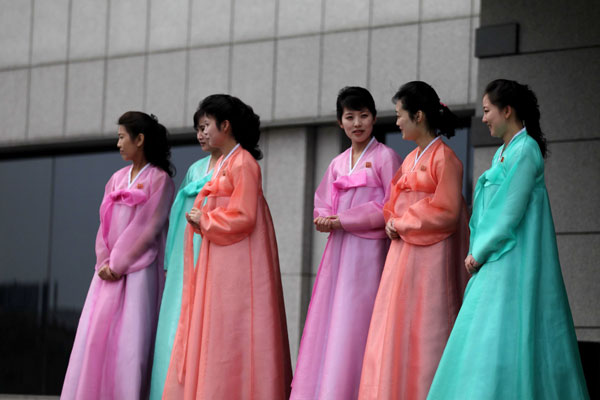DPRK is a land of surprises for visitors
Updated: 2012-04-19 08:03
By Wu Jiao in Pyongyang. (China Daily)
|
||||||||
The country's gradual moves toward opening up have attracted an increasing number of tourists. According to Simon Cockerell, a Beijing-based US tour guide who works for Koryo Tours, there are about 12 tourist agencies in the world arranging trips to the DPRK.
 |
|
A man passes a mural of Kim Il-sung and Kim Jong-il in a factory in Pyongyang. [Wang Jing / China Daily] |
Nowadays, as many as 3,500 Europeans travel to the country annually, compared with just 1,000 five years ago, said Cockerell. And the tours aren't cheap, a three-day trip costs about 1,000 euros ($1,311). Cockerell noted that the number of US tourists has grown from 200 in 2007 to around 700 last year. "So far this year, I've brought about 1,500 people here," he said. "The country welcomes us, but the profit it earns from tourism is minimal because the number of tourists is so small."
"Before I came here, most of what I knew (about the country) came from TV. It's a bit more modern than I expected and I think a lot of information about the place is outdated," said Michael Woodfood, a US tourist.
The increased economic interaction has also improved the lives of the locals. Overseas workers based in the country said a growing number of people in Pyongyang now shop in markets previously only visited by foreigners.
Foreigners, who mostly shop in stores that only accept payment in foreign currency, such as the euro, the dollar or Chinese yuan, said they were surprised that the local people have foreign currency in their wallets, as most only receive a monthly salary of around 2,000 DPRK won ($15).
One foreign worker said some locals trade with foreign countries by exporting natural resources and water-related goods. A joint industrial park with the ROK in the border area also provides hard cash.
However, while people are encouraged by signs of a potential policy watershed, the country's future direction remains unclear. On Tuesday, the DPRK rejected UN condemnation of its rocket launch and said it would no longer adhere to an agreement with the US to freeze its nuclear and missile programs. That rejection has resulted in calls for harsher sanctions to be imposed on Pyongyang.
But some observers said keeping the DPRK engaged with the outside world is a better solution to the Korean Peninsula crisis.
Katharina Zellweger, who has lived in Pyongyang for five years and served as the director for the Swiss Agency for Development and Cooperation in the DPRK, told Yonhap News last month that helping resolve the country's economic difficulties is the precondition to a change in its attitudes toward the outside world. She urged the international community to provide aid to the DPRK and emphasized that dialogue is the best way to promote further opening up.
|
Women dress up for the celebration. [Wang Jing / China Daily] |
A tale of dictionaries and cosmetics
"Do young lovers in Pyongyang dare to hold hands in public?" I put this question to my guide, Cha Yun-ho, a 26-year-old from the foreign affairs ministry of the Democratic People's Republic of Korea. That was one of the many stories - along with "Do people eat meat every week?" and "How can you build so many tall buildings?" - that we foreign reporters wanted to investigate.
The young diplomat, who is fluent in Chinese, immediately became animated: "How can you think such a thing? That's very insulting. Of course we can do everything here."
Cha wore a perpetual expression of grief when members of the foreign media - in the country to cover the satellite launch - asked about daily life in Pyongyang. Except for the 100 or so foreigners who work here long-term, we were told that every visitor from overseas would be accompanied by a guide while away from the hotel. Even if visitors simply wanted to walk out of their hotel, they had to notify the guide first. So the guide is one's primary source of information about how the ordinary people live and the country's policies towards foreigners, especially the foreign media.
Cha apparently comes from a well-off family in Pyongyang, wearing a watch worth hundreds of dollars. He proudly pointed out landmark buildings as our bus passed by and translated the songs when we were taken to the large-scale rallies arranged to mark what would have been the 100th birthday of the nation's founder, Kim Il-sung. This serious young man would occasionally take out a small notebook and jot down one of our colloquial Chinese expressions to decipher the correct meaning of the phrase.

 Relief reaches isolated village
Relief reaches isolated village
 Rainfall poses new threats to quake-hit region
Rainfall poses new threats to quake-hit region
 Funerals begin for Boston bombing victims
Funerals begin for Boston bombing victims
 Quake takeaway from China's Air Force
Quake takeaway from China's Air Force
 Obama celebrates young inventors at science fair
Obama celebrates young inventors at science fair
 Earth Day marked around the world
Earth Day marked around the world
 Volunteer team helping students find sense of normalcy
Volunteer team helping students find sense of normalcy
 Ethnic groups quick to join rescue efforts
Ethnic groups quick to join rescue efforts
Most Viewed
Editor's Picks

|

|

|

|

|

|
Today's Top News
Health new priority for quake zone
Xi meets US top military officer
Japan's boats driven out of Diaoyu
China mulls online shopping legislation
Bird flu death toll rises to 22
Putin appoints new ambassador to China
Japanese ships blocked from Diaoyu Islands
Inspired by Guan, more Chinese pick up golf
US Weekly

|

|






